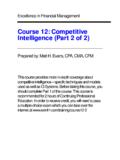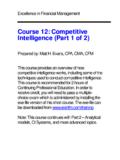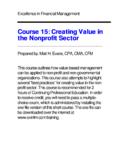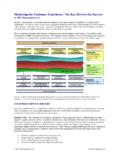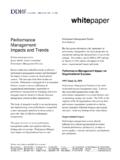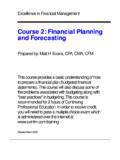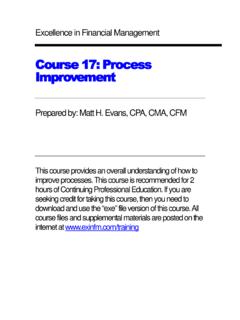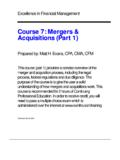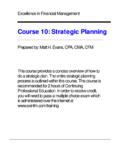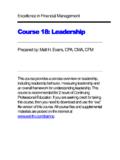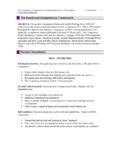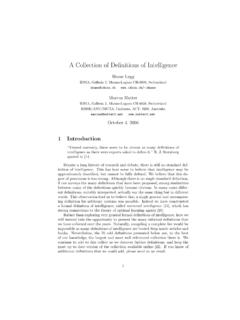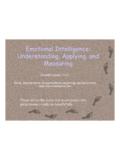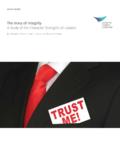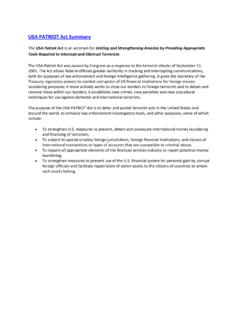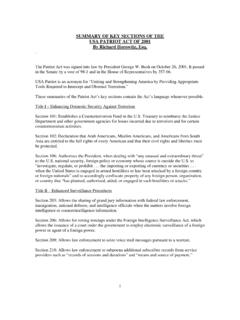Transcription of The Basics of Competitive Intelligence - exinfm
1 The Basics of Competitive Intelligence By Larry Kahaner author of Competitive Intelligence "It is pardonable to be defeated, but never to be surprised." -- Frederick the Great - Two men in an unmarked minivan cruise the streets around Philadelphia tuning in cellular phone transmissions. They're not eavesdropping on phone conversations, and they're not doing anything illegal or unethical. Using communications equipment previously only available to the military, they are measuring the strength and range of their competitor's signals. - A beer company analyzes wastewater pumping from a competitor's brewery.
2 Their ultimate goal is to save millions of dollars on promotional and advertising campaigns. - A business consultant and metallurgist study the thickness of rust on railroad tracks leading from a paper mill. It will tell them whether or not to open a competing facility. - During a strategy meeting of an electronics firm, a manager swaggers in playing the part of a competitor's CEO. He acts, dresses and even talks like the other person. * These people are involved in the mysterious and often murky world of global Competitive Intelligence . It's a world inhabited by corporate spies, former government gumshoes and hard-nosed business people looking for any angle to beat the competition.
3 2 What is Competitive Intelligence ? Competitive Intelligence is a systematic program for gathering and analyzing information about your competitors' activities and general business trends to further your own company's goals. When practiced responsibly it's legal and ethical, although some companies have been known to cross the line -- stealing information, wiretapping phones and burglarizing offices -- entering the darker realm of world of industrial espionage. Most companies don't enter this illegal world. In fact, it's unnecessary. Virtually everything they need to know is available albeit sometimes purposely hidden or hard to find.
4 These experts gather information by employing the latest technology and ingenious methods including satellite photo-reconnaissance, combing government databases, filing Freedom of Information Act requests, back-engineering and even hiring psychiatrists to analyze a competitor's decision makers. Companies often employ super-speed computers designed specifically for analyzing mountains of data. These skilled corporate agents ferret out information from the most unlikely of places and transform it into Intelligence that can turn their company around, build market share, launch new products or destroy a competitor. It's a hardball world that turns raw data into millions of dollars if done well.
5 If done poorly, their own company might perish as a result of their miscalculations. --- 3 What Competitive Intelligence Can Do For Your Company: Information vs. Intelligence The basis of Competitive Intelligence is knowing the difference between information and Intelligence . When executives say that they have too many reports to read, too much information to go through before making a decision, they're making the mistake of confusing information with Intelligence . What they really mean is that they have too much information and not enough Intelligence . Understanding the difference between these two items will help them get on the road to more efficient decision making.
6 Here's the difference: Information is factual. It's numbers, statistics, scattered bits of data about people and companies and what they've been doing that seems to be of interest. Information often appears to be telling you something but in reality it's not. You can't make good decisions based on information no matter how accurate the information is or no matter how comprehensive it is. Intelligence , on the other hand, is a collection of information pieces which have been filtered, distilled and analyzed. It has been turned into something that can be acted upon. Intelligence is what managers need to make decisions, not information. Another term for Intelligence is knowledge.
7 4 The United States is the most information-rich nation in the world. We have more information produced, more information stored and more information flowing through our computers and networks than anywhere else in the world. This massive amount of facts makes us think that data is important. Indeed, we think we live in the information age, but we couldn't be more wrong. While that was true several years ago, it is no longer the case. When computers and telecommunications merged in the mid-1980s, (Koji Kobayashi former chairman of NEC had the vision to realize that communications and computers were intertwined and so set his company on that course) information became so important that we traded it, moved it and worshipped it.
8 However, since that time, information has become a commodity. With the advent of massive commercial and government databases, information has become cheap and accessible at the same time. So, while we continue to establish new sources of data, it has become less important at the same time. Take the example of portable devices that allow us to receive commodity prices almost instantly anywhere we roam. If everyone who wants that capability can have it - and the prices have come to the point where even the amateur trader can afford the service - does that make the information less valuable? Yes, it does. If everyone has the same information, who has the edge over his competitors?
9 Because the commodities market usually is a zero sum game - somebody wins when somebody loses - pure information is no longer an edge. What gives a trader the Competitive advantage over someone else is his analysis of the prices, their movements and other factors. How he turns raw 5information into actionable Intelligence is what separates the successful trader from the one who fails. This is true of all businesses. The company that knows how to turn information into Intelligence will succeed and those that don't - or who simply continue to rely on information as sources of inspiration - will fail. What CI Can Do for Your Company Suppose you were going to hire a consulting firm.
10 Both come highly recommended, both have the same capabilities but one was much less expensive than the other. Be honest. Would your first thought be that the lower cost consultant could not be as good as the more expensive one? Of course. It's human nature to think so. Even though there might be other factors involved, the lower priced consultant would beg questions of competency. Now, suppose I told you that instituting a Competitive Intelligence system would require only minimal resources and a minute change in organizational structure. In other words, the start-up costs were low and the rewards extremely high. Would that change how you felt about it?
